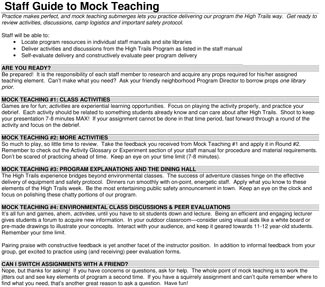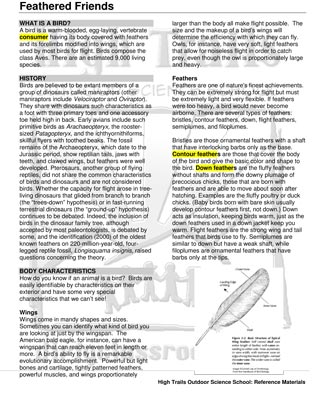 Max is one of those guys whose quirky sense of humor and far reaching smile instantly lights up a classroom. But right now, three days after the start of new staff training at High Trails, he’s super nervous and fumbling for words. He doesn’t know what he’s talking about, and everyone can tell.
Max is one of those guys whose quirky sense of humor and far reaching smile instantly lights up a classroom. But right now, three days after the start of new staff training at High Trails, he’s super nervous and fumbling for words. He doesn’t know what he’s talking about, and everyone can tell.
Even worse is that after this bout of embarrassment eight of his peers will sit in a circle and review the whole episode in a practice we call Mock Teaching.
Max had a whole day to figure out how he was going to teach a 5 minute lesson from one of our experiential classes, but it’s always harder to do than you think. All during staff training we force these little sessions upon staff in the hopes that it will jump start the amazing teacher within them.
 While sometimes uncomfortable and intimidating, mock teaching is the single most beneficial activity we have that prepares new staff for the upcoming school year.
While sometimes uncomfortable and intimidating, mock teaching is the single most beneficial activity we have that prepares new staff for the upcoming school year.
Mock teaching allows the staff a safe environment to practice teaching, teaches staff how to give and receive constructive feedback, and provides a venue to better understand the content of our outdoor education lessons.
Practice In Teaching
Our staff arrive here with varied experience; some are seasoned veterans from other outdoor programs, others are coming out of the classroom (like Max), and still others are fresh out of college with little teaching experience. Mock teaching sessions allow staff of all experience levels to have a safe environment in which they can develop their teaching style.
If you’ve never taught before, it’s tough to imagine the anxiety a teacher feels the first time they get in front of a group of students. Teaching to your peers, while no less (and probably more) intimidating, carries with it no real risk of failure. The entire goal here is to learn how to teach, and mistakes often make it easier to learn.
Give Feedback and Keep Friends
 Mock teaching also teaches our staff to both give and receive constructive feedback. We want our staff to embrace feedback without letting their ego get in the way of really listening. Giving solid criticism can be just as tough, and even the normally smooth and funny Max was at a loss for words when he initially had to evaluate one of his peers.
Mock teaching also teaches our staff to both give and receive constructive feedback. We want our staff to embrace feedback without letting their ego get in the way of really listening. Giving solid criticism can be just as tough, and even the normally smooth and funny Max was at a loss for words when he initially had to evaluate one of his peers.
Starting the feedback process early with mock teaching allows our staff to hone their observation and interpersonal skills with a member of the administrative team there to guide them through the process. It sets them up to spend the rest of the school year helping each other grow.
Better Learning Through Discussion
 One more benefit to mock teaching is that new staff have an opportunity to better understand the content they’re expected to teach. Every 5 minute lesson ends with a healthy discussion of both teaching technique and content. During one of his review sessions, the staff questioned Max’s explanation of the differences between hibernation, torpor, and estivation (common terms taught in our Furry Friends class). Three different opinons on the correct definintions arose from the class and teacher within 30 seconds.
One more benefit to mock teaching is that new staff have an opportunity to better understand the content they’re expected to teach. Every 5 minute lesson ends with a healthy discussion of both teaching technique and content. During one of his review sessions, the staff questioned Max’s explanation of the differences between hibernation, torpor, and estivation (common terms taught in our Furry Friends class). Three different opinons on the correct definintions arose from the class and teacher within 30 seconds.
A quick bit of research settled the matter, and the staff all learned something new about mammals and how best to explain it to students. In the long run, the entire staff began to master the content of the lesson plans while, at the same time, exchanged information that would allow everyone to become better educators.
Finally…
 The whirlwind of staff training eventually ended, and yellow busses carrying students finally arrived. Max headed out to teach, and after he overcame the initial shock and awe of elementary student energy and attention span, he got back in the game.
The whirlwind of staff training eventually ended, and yellow busses carrying students finally arrived. Max headed out to teach, and after he overcame the initial shock and awe of elementary student energy and attention span, he got back in the game.
His smile was contagious, his delivery smooth, and his content knowledge solid. A good portion of this can be directly attributed to those tough teaching sessions during training.
Mock teaching is a bit painful and uncomfortable at times, but it really does help you become a better teacher faster. Which is a good thing for new staff when the first students to arrive are just around the corner.
At High Trails Outdoor Science School, we literally force our instructors to write about elementary outdoor education, teaching outside, learning outside, our dirty classroom (the forest…gosh), environmental science, outdoor science, and all other tree hugging student and kid loving things that keep us engaged, passionate, driven, loving our job, digging our life, and spreading the word to anyone whose attention we can hold for long enough to actually make it through reading this entire sentence. Whew…. www.dirtyclassroom.com

Comments are closed.